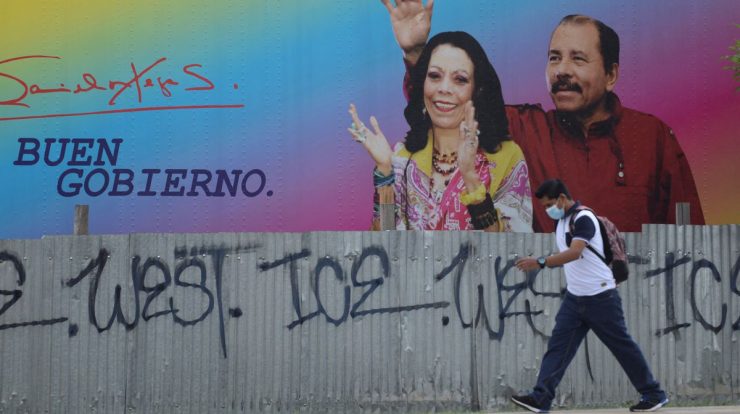
more information
On Monday, the European Union expanded a new set of sanctions against the regime of Nicaraguan President Daniel Ortega, significantly raising the position of those on the sanctions list. Among the eight names added to the list are Vice President and First Lady Rosario Murillo, and one of the couple’s sons, Juan Carlos Ortega Murillo, who is the director of one of the country’s major television stations. A leading position within the 4th of May Sandinista movement.
The European bloc accuses the eight senior officials of being “responsible for gross violations of human rights and/or actions that undermine democracy and the rule of law in Nicaragua”. Brussels also stresses that punitive measures “target specific individuals and are designed so as not to harm the population and economy of Nicaragua.” Thus, those sanctioned, who now make up a list of 14 names, are barred from entering any of the 27 countries that make up the European Union. The decision also provides for the freezing of the assets of those targeted for punishment on European soil, in addition to their inability to rely on financial resources coming from European citizens or companies.
The new European sanctions come on the heels of those imposed by the United States and the United Kingdom, two countries reacting to the deteriorating political situation there. It took the EU’s chief foreign policy representative, Josep Borrell, nearly a month to garner support from the bloc’s 27 partners to move forward with the new sanctions. However, since the beginning of July, in a speech to the plenary session of the European Parliament, Borrell has already made a call to the situation in the Central American country, saying that “Nicaragua has entered into a repressive spiral” whose goal “is to eliminate opposition candidates until November 7”. [de 2021]It is the day the country celebrates the presidential and parliamentary elections.
The High Representative’s concern is justified. Over the weekend that marked the end of July and the beginning of August, the country’s seventh presidential candidate was arrested. In the statement announcing the new sanctions, Brussels noted that the latest arrest “unfortunately illustrates the scale of repression in Nicaragua and presents a disturbing picture of the upcoming elections.”
For months, the European Union has been asking the Ortega regime to establish a dialogue with the opposition in order to ensure a credible and democratic process. The bloc also calls on the government to allow the return of international human rights organizations. The authority in Managua, in turn, ignores the requests, which precisely led to the tightening of penalties.
Support producing news like this. Subscribe to EL PAÍS for 30 days for 1 USD
click here
Ortega’s vice president and his wife, Rosario Murillo, are leading the new wave of sanctions. Considered the “second man” in the regime, she is accused of playing an “active role in encouraging and justifying the repression by the Nicaraguan National Police against opposition demonstrations in 2018”. In addition, the text states that in June of this year, Murillo “publicly threatened the Nicaraguan opposition and revoked the credentials of independent journalists.”
The President of the National Assembly, Gustavo Eduardo Porras Cortes, joins the first lady – for being at the head of a controversial amnesty law that prevents investigations into those responsible for the 2018 crackdown on protesters – as well as the country’s attorney general, chief justice, economic adviser to the prime minister, and two A senior official of the National Police and the couple’s heir, Juan Carlos, director of Channel 8, are classified in the text as “one of the main television channels and propaganda networks”.
The current sanctions regime against Nicaragua was approved by the bloc in October 2019, and since then, it has been used as a tool to respond to Ortega’s crackdown on opponents, as well as government pressure on the press and civil society. Similar measures have been seen against members of the Nicaraguan government involving an asset freeze (within the European Union) since May 2020, when the Commission approved a list of six names.
The first list, which is still in force, includes Ortega’s personal assistants on health and safety matters, a senior prison official, as well as the director and deputy director of the National Police – an agency implicated in the recent crackdowns. However, the list of names, which was released at the beginning of August, is aimed specifically at personalities in high positions, with an emphasis on the regime’s top management and the president’s family himself.
But there is no optimism. The European Commission recognizes that the impact of sanctions may be limited, allowing Ortega to continue on an authoritarian path with apparent impunity. “What is clear is that Ortega feels safe enough to arrest the most popular opposition leader without further street demonstrations,” Borrell told the European Parliament. Meanwhile, groups of MEPs are calling for a tougher policy on Nicaragua. However, Borrell noted that operations of this kind – as in the case of the new wave of sanctions now – require consensus, which in turn takes time to achieve. At the end of a new parliamentary debate on the situation in Nicaragua, the High Representative pointed out frankly that “as expected”, “we have heard many pleas” ‘Enough, Mr. Ortega!’ “. I can guarantee: Ortega is completely indifferent to these pleas.”
Participation over here To receive the daily newsletter from EL PAÍS Brasil: reports, analysis, exclusive interviews and key information for the day in your email, from Monday to Friday. Participation Also to receive our weekly newsletter on Saturday, with the highlights of the week’s coverage.
